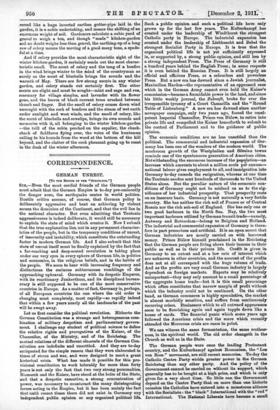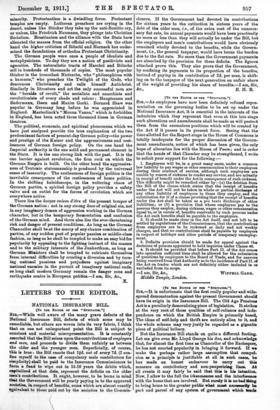CORRESPONDENCE.
GERMAN UNREST.
[To THE EDITOR OP TES " SPECTATOR."'
Sin,—Even the most cordial friends of the German people must admit that the German Empire is to-day pre-eminently the danger zone, the earthquake centre in world politics. Hostile critics assume, of course, that German policy is deliberately aggressive and bent on achieving by violent means the dominion of the Continent, and that the evil lies in the national character. But even admitting that Teutonic aggressiveness is indeed deliberate, it would still be necessary to explain the state of mind which creates it. Now I submit that the true explanation lies, not in any permanent character- istics of the people, but in the temporary conditions of unrest, of insecurity and instability, which constitute the outstanding factor in modern German life. And I also submit that this state of unrest itself must be finally explained by the fact that a far-reaching and deep-seated revolution is taking place under our very eyes in every sphere of German life, in politics and economics, in the religious beliefs, and in the habits of the people. We seem to hear with increasing frequency and distinctness the ominous subterranean rumblings of the approaching upheaval. Germany with its despotic Emperor, with its reactionary Junkerthum, and its disciplined bureau- cracy is still supposed to be one of the most conservative countries in Europe. As a matter of fact, Germany is, perhaps, of all European countries the one where the old order is changing most completely, most rapidly—so rapidly indeed that within a few years nearly all the landmarks of the past will be swept away.
Let us first consider the political revolution. Hitherto the German Constitution was a strange and heterogeneous com- bination of military despotism and parliamentary govern- ment. I challenge any student of political science to define the relative rights and prerogatives of the Kaiser, of the Chancellor, of the Ministry, and of the Reichstag. The mutual relations of the different elements of the German Con- stitution are indefinite and unsettled. And they are to-day antiquated for the simple reason that they were elaborated in times of stress and war, and were designed to meet a great historical crisis. What has made it possible for this pro- visional constitution to work tolerably for more than forty years is not only the fact that two very strong personalties, Bismarck and the Kaiser, have stood at the helm of the State, and that a despotic executive, a strong concentration of power, was necessary to counteract the many disintegrating forces acting in the Empire, but it has been mainly the fact that until recent times there did not exist in Germany any independent public opinion or any organized political life.
Such a public opinion and such a political life have only grown up for the last few years. The Kulturkampf has created under the leadership of Windthorst the strongest Catholic party in Europe. The industrial expansion has created under the leadership of Liebknecht and Bebel the strongest Socialist Party in Europe. It is true that the organized political life is not yet sufficiently expressed in, or supported by, a strong public opinion, and still less by a strong independent Press. The Press of Germany is still a hundred years behind the English Press ; in some respects it is even behind the Russian Press. It is still largely an official and officious Press, or a colourless and powerless Press. But a new era has dawned since a Jewish journalist, Maximilian Harden—the representative of an oppressed race which in the German Army cannot even hold the Kaiser's commission—became a formidable power in the land, and since his little weekly journal, the Zulcunft, broke for ever the irresponsible tyranny of a Court Camarilla and the " Round Table of Liehenberg." A new era has dawned since another newspaper campaign, only two years ago, forced the omni- potent Imperial Chancellor, Prince von Billow, to retire into private life and compelled the Kaiser henceforth to submit to the control of Parliament and to the guidance of public opinion.
The economic conditions are no less unsettled than the political. The commercial and industrial expansion of Ger- many has been one of the wonders of the modern world. The mushroom growth of the Westphalian and Silesian towns reminds one of the spontaneous generation of American cities. Notwithstanding the enormous increase of the population—an increase which amounts to about a million souls per annum--. national labour gives employment to all, and immigration into Germany to-day exceeds the emigration, whereas at one time the Teutonic exodus sent hundreds of thousands to the United States alone. But the peculiar nature of the economic con- ditions of Germany ought not to mislead us as to the sig- nificance of her industrial prosperity. That prosperity rests on an insecure basis. Germany is not naturally a very fertile country. She has neither the rich soil of France or of Central Russia nor the rich sub-soil of England. She has only one or two good harbours in the North Sea. Nay, the two most important harbours utilized by German transit trade—namely, Antwerp and Rotterdam—belong to Belgium and Holland. The industrial and commercial expansion of Germany is there- fore in part precarious and artificial. It is an open secret that German industries are mostly carried on with borrowed money. Prince Billow himself proclaimed in the Reichstag that the German people are living above their income in their public as well as in their private life. Credit is given in Germany to an extent and at a low rate of interest which arc unknown in other countries, and the amount of the profits does not at all correspond with the huge volume of trade. And as the profits are very small German industry is largely dependent on foreign markets. Exports may be relatively unimportant—they may only amount to a small percentage of the aggregate home trade—but it is this small percentage which often constitutes that narrow margin of profit without which the industry could not be continued. On the other hand, as German commerce is highly speculative, the market is almost morbidly sensitive, and suffers from continuously recurring crises. Businesses which to all outward appearance seem to be flourishing again and again topple down like a house of cards. The financial panic which some years ago followed the American crisis and the scare which recently attended the Moroccan crisis are cases in point.
We can witness the same fermentation, the same restless- ness, in the spiritual world. The old order changeth in the Church as well as in the State.
The German people were once the leading Protestant country, and the Kulturkampf against Romanism, the " Los von Rom" movement, are still recent memories. To-day the Catholic Centre Party wields greater power in the German Reichstag than any other party. And the policy of the Government cannot be carried on without its support, which generally has to be bought at a high price, and which is only given for a very short time. So little can the Government depend on the Centre Party that on more than one historic occasion the Catholics have entered into a monstrous alliance with the Socialists : the " black " International with the " red " International. The National Liberals have become a small
minority. Protestantism is a dwindling force. Protestant temples are empty. Lutheran preachers are crying in the desert, unless like Stocker they take up the anti-Semitic cry, or unless, like Friedrich Naumann, they plunge into Christian Socialism. Erastianism and the alliance with the State have alienated the masses from the official religion. On the other hand the higher criticism of Ritschl and Harnack has under- mined the foundations of orthodox Protestant Christianity.
The German people were once a people of idealists and metaphysicians. To-day they are a nation of positivists and agnostics. The naturalistic tracts of Haeckel and Bolsche sell in hundreds of thousands of copies. The most popular thinker is the iconoclast Nietzsche, who "philosophizes with a hammer," who preaches the Twilight of the Gods, who denounces Christianity and calls himself Antichrist. Similarly in literature and art the only successful men are the " heralds of revolt," the socialists and anarchists and revolutionists of every shade and colour ; Hauptmann and Sudermann, Ibsen and Maxim Gorki. Bernard Shaw was popular in Germany long before he was appreciated in England. Maeterlinck's " Monna Vanna," which is forbidden in England, has been acted three thousand times in German theatres.
The political, economic, and spiritual phenomena which we have just analysed provide the true explanation of the two predominant factors of present-day German policy—the power and prestige of the Kaiser and the aggressiveness and rest- lessness of German foreign policy. On the one hand the Imperial authority is the one solid and permanent element in the State. It is the one strong link with the past. It is the one barrier against revolution, the firm rock on which the German Empire is built. On the other hand the aggressive- ness of Teutonic statesmanship is produced by the universal sense of insecurity. The restlessness of foreign politics is the inevitable consequence of the restlessness of home politics. In the shifting kaleidoscope, in the weltering chaos of German parties, a spirited foreign policy provides a safety valve and an outlet for the forces of revolution which are everywhere active.
There lies the deeper raison d'être of the present temper of the German nation : not in any strong dose of original sin, not in any imaginary demon of aggression working in the German character, but in the temporary fermentation and confusion of the German mind. And there also lies the ever-threatening risk and danger of present conditions. As long as the German Chancellor shall be at the mercy of any chance combination of parties, of any sudden gust of popular passion or middle-class fashion, as long as he shall be tempted to make an easy bid for popularity by appealing to the fighting instinct of the masses and to the military interests of the Junkerthum, as long as German Ministers shall be tempted to extricate themselves from internal difficulties by creating a diversion and by turn- ing national passions and prejudices against imaginary national enemies in the pursuit of imaginary national ends, so long shall modern Germany remain the danger zone and earthquake centre in European politica—I am, Sir, &c.,



































































 Previous page
Previous page